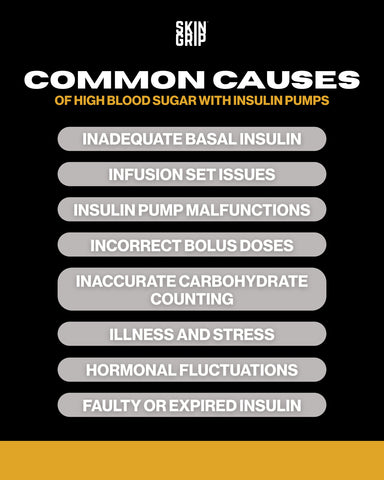This article was medically reviewed by Amanda Ciprich, MS, RD. Last updated on 2/21/24.

Managing blood sugar levels can be a complex task, even with access to advanced technology like insulin pumps. Despite using an insulin pump, you may still experience elevated blood sugar levels. In this blog post, we will explore some of the common causes and offer solutions to help you get your blood sugar back into range.

Common causes of high blood sugar with insulin pumps
High blood sugar, also known as hyperglycemia, can occur for various reasons in individuals who use insulin pumps to manage their diabetes. While insulin pumps are designed to help maintain blood sugar within a target range, there are several common factors that can lead to elevated blood sugar levels when using an insulin pump that include:
- Inadequate basal insulin
- Infusion set issues
- Insulin pump malfunctions
- Incorrect bolus doses
- Inaccurate carbohydrate counting
- Illness and stress
- Hormonal fluctuations
- Faulty or expired insulin
Inadequate basal insulin
If your programmed basal insulin rate is not adequate, it may not provide enough background insulin to meet your body’s needs between meals and during periods of inactivity. This can result in elevated blood sugar levels.
It is crucial to work closely with your healthcare provider or diabetes educator as they can help fine-tune your insulin pump settings, including basal rates.
Infusion site issues
A common reason for elevated blood sugars when using an insulin pump is a problem with the infusion site. The infusion site is where the insulin is delivered into your body. Issues such as scar tissue, dislodgement or cannula occlusion can lead to high blood sugar levels.
To address these issues, try rotating your infusion sites regularly to prevent scar-tissue build up and ensure that the tubing and cannula are not kinked or obstructed. You may also consider using overpatches to keep infusion sites from becoming dislodged. Regularly monitoring and maintaining your infusion sites can help ensure your insulin pump works effectively and helps manage your blood sugar levels more consistently.
Insulin pump malfunctions
Technical issues with the insulin pump such as battery problems, software errors or pump failure can disrupt the continuous delivery of insulin and lead to elevated blood sugar levels.
In the event of a malfunctioning pump, you should contact your insulin pump manufacturer to arrange a replacement and initiate your backup insulin pump plan.
Incorrect amount and timing of bolus insulin
Incorrect amount and timing of bolus insulin can lead to high blood sugars because it is intended to cover the immediate rise in blood sugar that occurs after meals. If you take too little bolus insulin, your body won’t have enough insulin to help your body manage the post-meal blood sugar spike.
Additionally, it is essential to consider meal and insulin timing as taking mealtime insulin prior to eating gives insulin time to start working before your blood sugar rises. If you take insulin after eating, you may experience more elevated blood sugar levels and blood sugar fluctuations.
Healthcare providers can provide personal guidance to effectively make adjustments to bolus insulin and help you manage your blood sugar levels.
Inaccurate Carbohydrate counting
Inaccurate carb counting can lead to high blood sugar levels in people with diabetes because the amount of carbohydrates you consume directly affects your blood sugar levels. When you eat carbohydrates, your digestive system breaks them down into glucose (sugar), which is then absorbed into your bloodstream. To manage blood sugar levels effectively, individuals with diabetes often need to match their insulin dose to the amount of carbohydrates they're about to eat. If you underestimate the number of carbs in your meals or snacks, you may not receive enough insulin. To improve carb counting accuracy, consider utilizing measuring cups and food scales or meet with a registered dietitian or diabetes educator to learn more about how food impacts your blood sugars.
Stress and illness
When you're under stress, your body releases stress hormones such as cortisol and adrenaline. These hormones trigger the liver to release glucose into the bloodstream. In people with diabetes, this can lead to an increase in blood sugar levels. This is often referred to as the "fight or flight" response. It's important to work closely with a healthcare provider or diabetes educator to develop a plan for managing blood sugar during times of stress or illness and to understand how stress and specific illnesses may affect your insulin needs.
Hormonal changes
Hormonal changes such as those related to growth and menstrual cycles impact blood sugar levels in individuals with diabetes. Your insulin needs may vary during these times due to the increased hormones and insulin resistance. You may need to adjust your insulin needs during periods of hormonal changes under guidance of your healthcare team to keep blood sugars from staying persistently elevated.
Faulty or expired insulin
Using expired or ineffective insulin can be a significant factor in elevated blood sugar levels. Insulin can lose its effectiveness over time or due to improper storage.
Always check the expiration date of your insulin as expired insulin may not work as intended and lead to elevated blood sugar levels.
Adhere to storage recommendations by keeping unused and unopened insulin in the refrigerator. Once insulin has been opened, it can stay at room temperature for about one month. However, extreme temperatures can compromise its effectiveness that can result in elevated blood sugar levels.
Troubleshooting high blood sugars with an insulin pump
The chart below outlines possible issues insulin pump users may encounter and how to troubleshoot when blood sugar levels are elevated. If high blood sugar levels are persistent, contact your insulin pump manufacturer and healthcare provider.

Conclusion
Insulin pumps help many people with diabetes manage their blood sugar levels. Despite their effectiveness, there are several reasons why insulin pump users may experience elevated blood sugar levels. High blood sugar levels can result from a combination of factors, including technical issues, equipment malfunctions, and the need for ongoing adjustments to insulin settings to align with the body's ever-changing requirements. Understanding these potential challenges and maintaining regular communication with healthcare providers can empower individuals with diabetes to fine-tune their insulin pump therapy and effectively address elevated blood sugar levels, ultimately enhancing their overall diabetes management and quality of life.
About Amanda Ciprich, MS, RD
Amanda Ciprich, a registered dietitian with a specialization in type 1 diabetes, was diagnosed with T1D herself at the age of 18. With her expertise and personal experience, she has authored two books, including "The Caregiver's Guide to Diabetes: Practical Advice for Caring for Your Loved One." As the founder of T1D Nutritionist, a virtual insurance-based private practice, Amanda provides counseling and guidance to individuals with T1D and their families, supporting them in effectively managing diabetes.
Shop Skin Grip Adhesive Patches
































